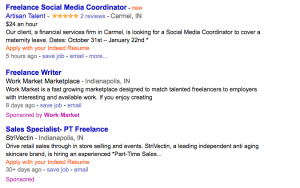Thank You, But We’re Not Hiring (You)
Thank you for your interest in our company. Though your resume was impressive, we have decided to consider other applicants further. I apologize for the disappointing news, best of luck in your job search.
After reading an email like the one above, a flurry of emotions begin to take hold. Overwhelming disappointment, crippling self-doubt, and a fear of eternal unemployment begin to manifest when reading rejection after rejection. College students and recent graduates, who were once eager to take on the business world, receive these emails and are quickly knocked down into the dark hollows of reality and exclusion.
College students spend four years participating in activities, workshops, volunteer events, and clubs among the countless hours of class and homework to simply be told that, outside of internship experiences, any extracurriculars hold little to no bearing on what the business is actually looking for in a candidate. Internship experience is often heavily tied to your major; CNN reported the following about various college majors and levels of success found through employment rates as well as wage:
Graduates who majored in agriculture, construction or nursing are dominating the job market. Their unemployment rates are 2% or lower — less than half the national average of 5%. Recent grads with nursing degrees make about $48,000 a year. Fine arts graduates struggle a lot — their starting salaries are on the lower side of the spectrum of new graduates: $29,000 a year, 7.6% are without a job and 62.3% end up taking lower paying jobs that don’t require a college degree.
This may seem daunting, but I am here to help! As an English major, I was told time and time again that I would never find a job – we all know the English major jokes, like McSweeney’s, Things to do with your English Degree, but in reality, it doesn’t matter what degree you have or even how hard you work – what matters is how smart you work or at least how smart you say you worked on your resume. The key is phrasing and confidence. So let’s start on how to even get through the countless job boards in order to gain the attention of a potential employer.
Where to Look
Indeed, Monster, CareerBuilder, and here in Indianapolis–the Charitable Advisors nonprofit job board—are just a few of the many job boards that you, a potential applicant, can look through to find a position nearly anywhere in the world. Some of my tips are to really look at the descriptions before you just click “Apply” all willy-nilly. After all, you don’t want to receive emails and phone calls from employers in which you’re not actually interested…it’s a waste of everyone’s time, yours included.
When looking at the postings, there should be some key takeaways and red flags. With each post and potential application you should make a mental pros/cons list. As an example, let’s look at the three listings:
1st Post – Freelance Social Media Coordinator:
Pro: “Posted five hours ago” – ensures that you’ll be one of the first applicants
Con: “Dates: October 31st-January 22nd*” – no potential to work more than 3 months
2nd Post – Freelance Writer
Pro: “Sponsored by Work Market” – since the company is sponsoring their own work, it is likely that they are well known and can provide a position that is exactly what you are looking for (in the freelance world)
Con: “Sponsored by Work Market” – oftentimes when a job listing is sponsored, it either has been dormant or it is done through a recruiting agency (which isn’t always a bad thing, it’s all about your personal preference) and Work Market is a site that requires payment for specific applications
3rd Post – Sales Specialist – PT Freelance
Pro: “Part-Time Sales” – as long as you enjoy sales positions, this is guaranteed to not have a predetermined end date
Con: “Posted 30+ days ago” – this job has probably been dormant or filled for awhile now.
Generally, it is unlikely to hear back from a listing that has been posted for more than 10 days (based on personal experience)
Though I can’t guarantee you these methods will work in finding you a job, I have listed a few websites where you can find a job, potentially leading you to the pond of real-world employment (or interning).
Indeed
VelvetJobs (this one requires a membership)
Charitable Advisors (non-profit positions)
Monster
SimplyHired
Selling Yourself (and Skills)
I’ve mentioned a few times that the huge selling point is phrasing and working smarter, not harder; in a resume, cover letter, or interview you want the employer to see you as an ideal fit. As a fine arts grad myself, this should be overwhelmingly concerning, right? Well, lucky for me, I minored in business and interned solely in the marketing field throughout college (hence, I am able to phrase my experience as a strong concentration in business and marketing). My dreams of being an editor-in-chief and publishing young adult authors such as Sarah Dessen and J.K. Rowling have been put on the back burner (for now) in order to make ends meet. I’m kidding – I truly have enjoyed working in the marketing field, and anyone that enjoys reading, editing, and writing should strongly consider looking into a business-esque job because the possibilities are endless. But that doesn’t let everyone off the hook; if you didn’t minor or intern in the business field, how do you even land an interview?
First, you’ve got to believe in yourself. Sounds cheesy, I know, but if you think you’re qualified, than others are more likely to believe it too. Your resume is the primary place to present this confidence. Everyone knows how to list jobs and internships, but not everyone knows how to describe the experience. Monster, one of the job boards listed above, made a list of mistakes to avoid that you can check out here, but what I have found to be most important are tips number four and eight.
4. Highlighting duties instead of accomplishments
It’s easy to slip into a mode where you simply start listing job duties on your resume…Employers, however, don’t care so much about what you’ve done as what you’ve accomplished in your various activities. They’re looking for statements more like these:
· Used laptop computer to record weekly meeting minutes and compiled them in a Microsoft Word-based file for future organizational reference.
· Developed three daily activities for preschool-age children and prepared them for a 10-minute holiday program performance.
· Reorganized 10 years worth of unwieldy files, making them easily accessible to department members.8. Leaving off important information
You may be tempted, for example, to eliminate mention of the jobs you’ve taken to earn extra money for school. Typically, however, the soft skills you’ve gained from these experiences (e.g., work ethic, time management) are more important to employers than you might think.
These tips lead the employer to see that you’re driven to achieve rather than someone likely to sit by and wait for direction. Success, no matter how big or small, is an important factor to exhibit on a resume. It shows the employer that you are motivated and confident in your ability to bring achievement to a team. It’s easy to become discouraged when entering the workforce, but what is important to remember is that you are capable of anything you set your mind to. Finding a job you like is hard but selling yourself on a piece of paper is even harder; you have to believe that you deserve that job then take the necessary steps to obtain it.
The hiring playing field is far from level, but by being confident in your skill set and searching in the right places, you may find just the job you’ve been looking for.
Image credit: Dealing With Rejection by Honest Blogger (contact)











 15% OFF FULL-SERVICE HIRING • APPLICANT TRACKING SOFTWARE • ONBOARDING SOFTWARE
15% OFF FULL-SERVICE HIRING • APPLICANT TRACKING SOFTWARE • ONBOARDING SOFTWARE